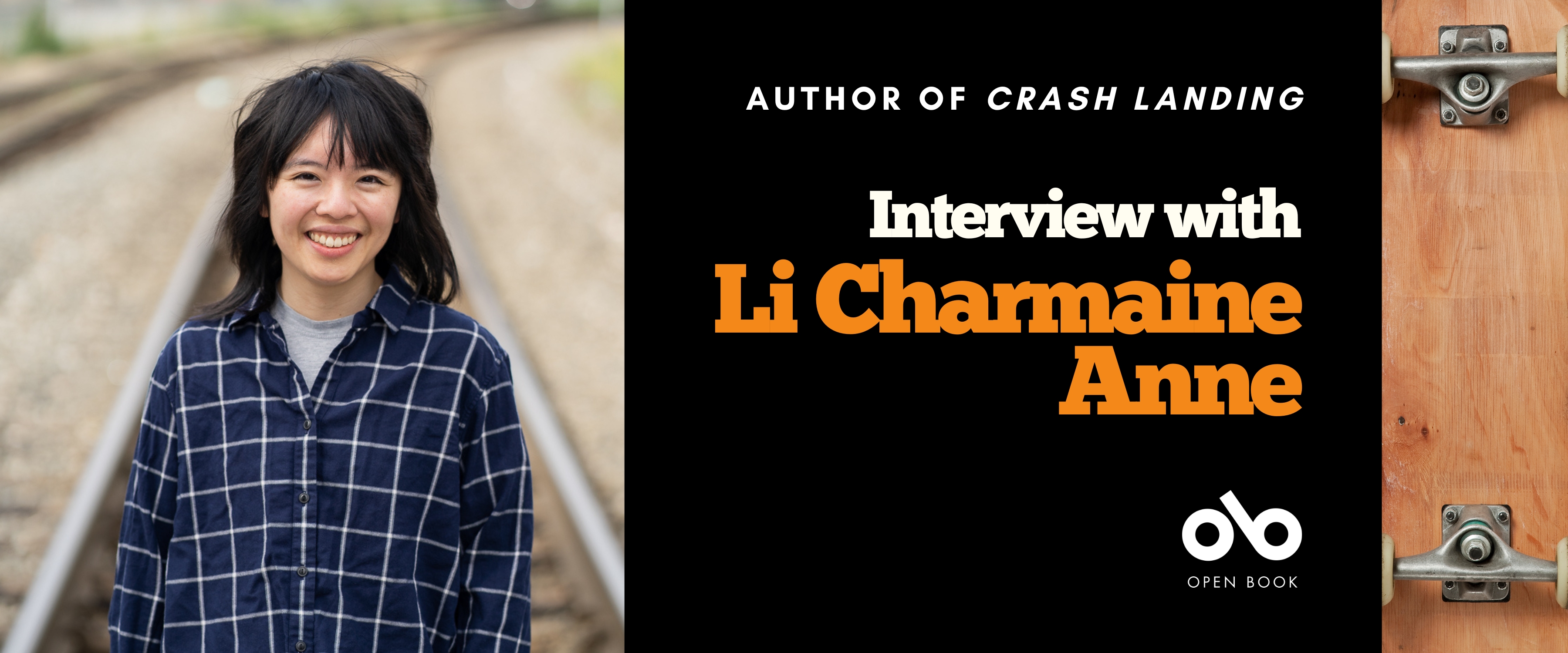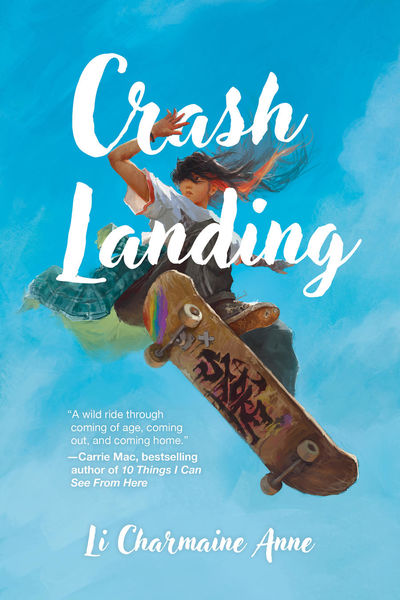Li Charmaine Anne's Characters Carve Asphalt and a Place For Themselves in the World in Crash Landing
When you're a teenager, finding your own place is more than just a matter of comfort – it can feel more like a matter of survival. For Jay Wong, the waning days of the summer before senior year mean a slow, hot ticking clock counting down her chance to find her people and, with her beloved skateboard in tow, her place in the high school ecosystem.
Jay is the relatable heroine of Li Charmaine Anne's compulsively readable YA debut, Crash Landing (Annick Press). When Jay meets Ash Chan, things finally feel different. From learning tricks on the board from Ash to finally finding a place to explore her full self, Jay feels suddenly complete. But Ash has a secret, and as Jay's curiosity gets the best of her, their new connection is put to the test. Set against the backdrop of a vibrant Vancouver skate scene, Crashing Landing is a showcase of the incredible difference a single, influential relationship can have, especially for queer and racialized youth.
We're talking to Li Charmaine Anne today as part of our Offering to film Ash’s submission to an upcoming skate contest introduces Jay to a side of Vancouver she’s never seen and gives her the chance to push back against the expectations placed on her. But Ash has a secret, and Jay is increasingly desperate to figure it out. As things between them ride the fine line between friendship and something more, Jay has to decide just how much Ash will impact all the choices she still has to make about where she’s going and who she wants to become.
Open Book:
Tell us about your new book and how it came to be.
Li Charmaine Anne:
Crash Landing is a coming-of-age novel about two Chinese-Canadian girls, Jay and Ash, who meet the day before their last year of high school in the laneway behind their houses. They bond over their shared love of skateboarding and filmmaking, become friends, and maybe something more…
I have been writing stories about girls and board sports for a very long time—my first attempt at a skater girl novel was when I was still a teenager myself. Then, during the pandemic, I was walking in the laneway behind my house when I saw in my mind two girls meeting there on their skateboards. That kickstarted this version of the novel.
OB:
Is there a character in your book that you relate to? If so, in what ways are you similar to your character and in what ways are you different?
LCA:
I am definitely similar to my first-person protagonist, Jay. In fact, my friends have said she talks just like me.
We are both queer, of Hong Kong Chinese descent, and the children of immigrants. We also both love skateboarding! However, I’m an only child and I wasn’t as brave as Jay when I was her age… Jay and I come from middle-class households where academics were the highest priority. Jay rebels against this and gets pretty far out of her comfort zone in the book. I never did that—perhaps because my parents were more supportive of my artistic endeavours.
Jay meets Ash, someone from a similar cultural background but different in almost every other way. She’s not nearly as privileged as Jay and makes Jay question everything she’s been taught. I can say I’ve met several Ashes over the years: people who walk into your life and put a dramatic spin on your perspective. It’s humbling and inspiring.
Your CanLit News
Subscribe to Open Book’s newsletter to get local book events, literary content, writing tips, and more in your inbox
OB:
YA features some strong genre themes and tropes (e.g. the chosen one, the outsider protagonist, missing or dead parents). How do you feel about those elements of the genre?
LCA:
I don’t think there’s anything “wrong” with tropes—there’s a reason why they work and why we keep coming back to them. But I think it’s important to question tropes, even if you plan on using one.
For example: the dead parents one. YA is rightfully youth-centered, and I think sometimes authors are anxious to “get rid of” the adults somehow. But in real life, young people are stuck having to deal with adults.
Jay’s parents get a lot of screentime in Crash Landing, and I was very careful in how I tackled the “strict Asian parent” stereotype. I know the stereotype comes from somewhere—many young people who share my background report overbearing and demanding parents—but I didn’t want to reduce the parental characters to cartoon boogey(wo)men. So, I probed into the question of WHY Asian immigrant parents are like this. Perhaps, as immigrants of colour forever perceived as outsiders, they’re worried about their offspring having to work twice as hard for half the results.
So, I tried my best to make Jay’s parents three-dimensional, to have their beliefs and actions make sense from their life experience. I also tried to make them “optimistic” characters capable of change…but I don’t want to give too much away!
OB:
What do you need in order to write – in terms of space, food, rituals, writing instruments?
LCA:
I’m a firm believer in making the physical act of writing (or any work you want to get done, for that matter) as pleasurable as possible so that you’re motivated to keep doing it.
For me, there are the obvious ergonomic things: comfortable chair that fits you, computer screen at eye level, footrest because I’m short... I have a mechanical keyboard so typing feels nice. I find instrumental jazz particularly conducive to my productivity. And, of course, I have coffee and something sweet!
Dark roast + egg tart + brown switches + Miles Davis = pure joy. Honestly, it doesn’t get much better than that.
OB:
Was there a YA book you read as a young adult that is particularly meaningful to you?
LCA:
Many! I lived to read as a kid.
But the book that probably “changed my life” was The Sight by David Clement-Davies because it got me writing for real. Right after reading this book in Grade 4, I decided to embark on the adventurous task that is Writing a Novel.
That first novel I wrote was basically a copy of the premise in The Sight, except instead of wolves I had eagles as characters. It was tropetastic (Chosen Ones and prophecies aplenty) and I blatantly appropriated the softly flowery writing style David Clement-Davies uses to put you in another world.
This was, objectively speaking, not a successful piece of writing. But I finished writing a full novel few years later, when I was barely a teenager, and it showed me that if I put in the hours and passion, I could write a book.
The Sight catalyzed an important awakening. I was dead-set on becoming a writer from then on.
…And nearly twenty years later, I officially published my first book!
OB:
What's your favourite part of the life cycle of a book? The inspiration, writing the first draft, revision, the editorial relationship, promotion and discussing the book, or something else altogether? What's the toughest part?
LCA:
My favourite is probably writing that first draft. Yes, it’s daunting, but it’s the phase where you’re allowed to do anything. You don’t have to worry about story logic, pacing, grammar, all that stuff. You can let imagination run amok.
Everything after that is quite enjoyable too. I loved working with my editors—they are very smart people who know your story with a lot of depth, who give very intelligent feedback. It’s a privilege to get that kind of feedback.
The toughest part was right before going to press: everything seemed so final. This was my first book, so there were many new and intense feelings. Here was when it hit me that my story would be read by people I don’t even know.
The part right now—promoting the book—is challenging too, mostly because I’ve never made it this far before! But I’m having fun with it. When someone who’s not your friend or parent or classmate reads your story and says something nice about it, it’s an incredible feeling.
__________________________________________________
Li Charmaine Anne (she/they) grew up in the unceded Coast Salish territories (a.k.a. Vancouver, British Columbia), where she skates, writes, and makes music. Crash Landing is her first novel.
Kevin Hardcastle is a fiction writer from Simcoe County, Ontario. He studied writing at the University of Toronto and at Cardiff University. His work has been widely published in journals including The New Quarterly, The Malahat Review, Joyland, Shenandoah and The Walrus. Hardcastle was a finalist for the 2012 Journey Prize, and his short fiction has been anthologized in The Journey Prize Stories 24 & 26, Best Canadian Stories 15, and Internazionale.
Hardcastle’s debut short story collection, Debris, was published by Biblioasis in 2015. Debris won the 2016 Trillium Book Award, the 2016 ReLit Award for Short Fiction, was runner-up for the 2016 Danuta Gleed Literary Award, and was a finalist for the Kobo Emerging Writer Prize.
His novel, In the Cage, will be published by Biblioasis in Fall 2017.






